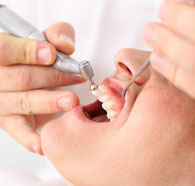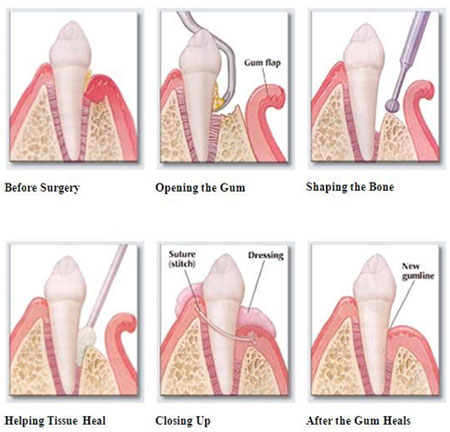
Gum Disease Treatment
-

Periodontal diseases range from simple gum inflammation to serious disease that results in major damage to the soft tissue and bone that support the teeth. In the worst cases, teeth are lost.
Gum disease is a threat to your oral health. Research is also pointing to possible health effects of periodontal diseases that go well beyond your mouth (more about this later). Whether it is stopped, slowed or gets worse depends a great deal on how well you care for your teeth and gums every day, from this point forward.
Care is better than cure, consult one of gum treatment specialist at Bright Smile Dental Clinic now and take care of your dental hygiene.
What causes Periodontal Disease?
Our mouths are full of bacteria. These bacteria, along with mucus and other particles, constantly form a sticky, colorless "plaque" on teeth. Brushing and flossing help get rid of plaque. Plaque that is not removed can harden and form bacteria-harboring "tartar" that brushing doesn't clean. Only a professional cleaning by a dentist or dental hygienist can remove tartar. Contact one of our dentist who are highly experinenced in the treatment of gums.
Gingivitis

The longer plaque and tartar stays on the teeth, the more harmful they become. The bacteria cause inflammation of the gums that is called "gingivitis." In gingivitis, the gums become red, swollen and can bleed easily. Gingivitis is a mild form of gum disease that can usually be reversed with daily brushing and flossing, and regular cleaning by our dentist or dental hygienist. This form of gum disease does not include any loss of bone and tissue that hold teeth in place. Call us to discuss the procedures for gum disease treatment.
Periodontitis

When gingivitis is not treated, it can advance to "periodontitis" (which means "inflammation around the tooth.") In periodontitis, gums pull away from the teeth and form "pockets" that are infected. The body's immune system fights the bacteria as the plaque spreads and grows below the gum line. Bacterial toxins and the body's enzymes fighting the infection actually start to break down the bone and connective tissue that hold teeth in place. If not treated, the bones, gums, and connective tissue that support the teeth are destroyed. The teeth may eventually become loose and have to be removed
Risk Factors
- Smoking. Need another reason to quit smoking? Smoking is one of the most significant risk factors associated with the development of periodontitis. Additionally, smoking can lower the chances of success of some treatments
- Hormonal changes in girls/women. These changes can make gums more sensitive and make it easier for gingivitis to develop
- Diabetes. People with diabetes are at higher risk for developing infections, including periodontal disease
- Stress. Research shows that stress can make it more difficult for our bodies to fight infection, including periodontal disease
- Medications. Some drugs, such as antidepressants and some heart medicines, can affect oral health because they lessen the flow of saliva. (Saliva has a protective effect on teeth and gums.)
- Illnesses. Diseases like cancer or AIDS and their treatments can also affect the health of gums
- Genetic susceptibility. Some people are more prone to severe periodontal disease than others
Who gets Periodontal Disease?
People usually don't show signs of gum disease until they are in their 30s or 40s. Men are more likely to have periodontal disease than women. Although teenagers rarely develop periodontitis, they can develop gingivitis, the milder form of gum disease. Most commonly, gum disease develops when plaque is allowed to build up along and under the gum line.
What can I do to Prevent Gum Disease?
Here are some things you can do to prevent periodontal diseases:
- Brush your teeth twice a day (with a fluoride toothpaste)
- Floss every day
- Visit the dentist routinely for a check-up and professional cleaning
- Eat a well-balanced diet
- Don't use tobacco products
How do I Know if I Have Periodontal Disease?
Symptoms are often not noticeable until the disease is advanced. They include:
- Bad breath that won't go away
- Red or swollen gums
- Tender or bleeding gums
- Painful chewing
- Loose teeth
-
Sensitive teeth
Any of these symptoms may signal a serious problem, which should be checked by a dentist. At your dental visit: - The dentist will ask about your medical history to identify underlying conditions or risk factors (such as smoking) that may contribute to periodontal disease
- The dentist or hygienist will examine your gums and note any signs of inflammation
- The dentist or hygienist will use a tiny ruler called a 'probe' to check for periodontal pockets and to measure any pockets. In a healthy mouth, the depth of these pockets is usually between 1 and 3 millimeters
- The dentist or hygienist may take an X-ray to see whether there is any bone loss
Contact one of our dentist at Bright Smile Dental and Orthodontic Center in Jumierah on Al Wasl road for your gum treatment.

Your teeth come under constant attack from the starches and sugars present in our food which are released as we eat. When this combines with plaque – the sticky bacterial film that forms on the teeth over time, it produces an acid which is harmful to our teeth.
read more...
When you look in the mirror and smile, are you happy with the results? Some people are happy, some are not. In some cases, too much of their gums is visible around their teeth which creates a “gummy” look. Others may dislike their smile because their gums have receded so much that their teeth look much longer than normal.
read more...
As its name suggests, dark gum pigmentation refers to a discoloration, or pigmentation, of the gums in the mouth. The condition can affect the entire gums, or just patches of the gums. Though it is not a life-threatening condition, the quality of your smile can be severely impacted if it goes left untreated.
read more...
Laser Therapy is commonly referred to as Laser Assisted Periodontal Therapy (LAPT). The diode laser that performs LAPT is an important and extremely effective therapy used by Bright Smile Dental and Orthodontic Center to treat periodontal or gum disease through the process of regeneration
read more...
Contact Us/ Send an Enquiry Click Here
Bright Smile Center
Bright Smile Dental & Orthodontic Center,
Al Shafar Bldg 7,
Jumeirah One,
Al Wasl Road,
Unit #105, Dubai - UAE,
PO Box 252189,
Tel : +971 4 344 9675
Fax: +971 4 344 9657
Email: info@brightsmile.ae
Our area is next to the famous city walk. It is the same building of 2XL Furniture, located between Life Pharmacy and Aswaq Supermarket, and opposite of Emarat Petrol Station.
Working Hours
Saturday to Wednesday
10:00am – 20:00pm
Thursday
10:00am – 18:00pm
(Friday Closed)

 English
English  العربية
العربية 



